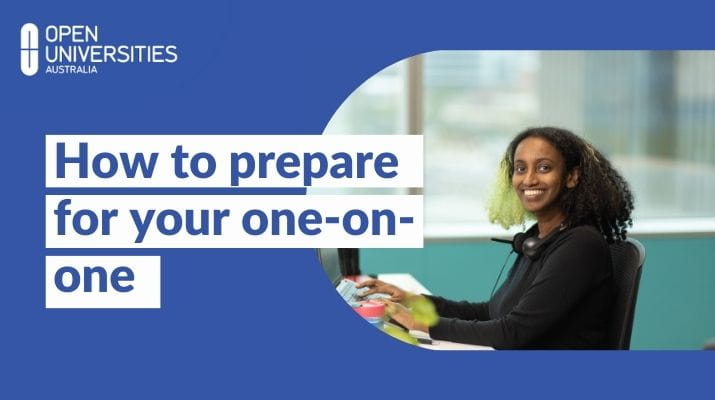Fit learning around your life
Through Open Universities Australia, you can study online, anywhere, anytime.
With effective study planning, you’ll work out how much of your week to allocate to study, how many subjects you can manage at once, and how much of the year you’ll commit to your course.
Get these things right and you’re well on your way to success.
4 steps to great study planning
The best study planning goes beyond just picking start dates. When you’re realistic about your lifestyle and commitments, you can work out how much time you really have for study, and achieve a balance between work, home, and uni.
During study planning for university, there are 4 things you need to consider:
The amount of time you’ll devote to study per week.
Do a self-assessment of your work, home, and other commitments to calculate how much time is free for study.
The number of subjects you’ll take on in a study term.
Consider the time needed for a subject’s readings and assessments—that’s at least 10 hours per subject.
The number of study terms you’ll commit to each year.
Check your calendar for holidays and big commitments because you might need time away from studies.
Nothing is set in stone so review, rejig, and maybe take a break.
Every study term, take a moment to reassess your commitments. Then accelerate, slow down, or even take a break.
Answers to your questions about study planning
To help you with the finer details, we’ve compiled answers to questions students frequently ask around study planning.
Need to know the difference between full-time and part-time study loads? Or study periods versus semesters? Then read on.
How many hours should I study per week?
We find that a single undergraduate subject usually calls for 10 to 12 hours of study each week.
When it comes to postgraduate subjects though, the amount of time you’ll need to put aside can change depending on your university and your degree. Generally, you’ll be studying more hours at a postgraduate level than you would for undergraduate subjects.
How many subjects can I take at a time?
Working out the number of subjects you’ll take at one time – your study load – depends on several things, including:
- Whether you're starting out or you’ve been studying for a while.
- How comfortable you are online, and your experience with computers and the internet.
- The amount of time each week you can put towards your studies.
One subject per study term is a good starting point. If you’re not too familiar with online technology, this might be the best way for you to get used to online study. Part-time students typically study one subject in a study term.
We suggest taking no more than two subjects per study term. Full-time students typically study two subjects in a study term. Keep in mind that three subjects in one study term at the undergraduate level will need between 30 and 36 hours of your time—that’s nearly the same as a full-time job!
If you’re a highly motivated student, there’s the option of taking up to four subjects each study term. But remember, this could require up to 50 hours of study per week, so it’s not for everyone. And some unis might not even allow it.
Study load and Centrelink
Once you’re studying full-time through us, you could be eligible to receive a study allowance from the Australian Government.
To be considered full-time, your study load is key. We measure the study load of each subject using a scale called the Equivalent Full Time Study Load—or EFTSL—and yes, this is also recognised by Centrelink. Full-time study means that your subjects have a combined EFTSL of at least 0.250. This is normally two subjects, requiring 20 to 24 hours of study per week. Keep in mind, not all subjects have a standard EFTSL of 0.125, so double-check the EFTSL before enrolling in a subject.
How many study terms can I fit in a year?
The university year is divided into study terms, or what's sometimes called study periods, semesters, sessions or trimesters, depending on where you're studying. You can choose to start in the study term that suits you best.
You can explore all the study terms, including their start and end dates, at Key dates.
Many students choose to study all year round. They enrol in subjects in Study Period 1, Study Period 2, Study Period 3, and Study Period 4. And some students really accelerate their degree by enrolling in several subjects per study period. This option isn’t for everybody, but some students enrol in four subjects each study period and complete their undergraduate degree in 18 months!
We think flexibility is great, but we also think holidays are great too. So depending on what you’re studying, you might choose to take a study term off.
Help! How can I find out more?
Student advisors
Our student advisors know all about study planning. They’ll factor in your lifestyle and commitments to help you make study planning decisions that are right for now. And when things change, reach out to them to review and rejig.
Contact a student advisor.
Insights blog
Our collection of articles is full of study advice and inspiration to keep you motivated and making good decisions. See Courses & the study experience for realistic advice from academics and student advisors.
Open the insights blog.
How to make changes
We absolutely realise that there can be times you need to step away from your studies.
Taking a break from single subjects
You’re in control so you can put your studies on hold until you're ready to resume. With multiple study terms throughout the year, you can start and stop as you need.
Taking a break from a full degree
In most instances, unis allow a “leave of absence”. Your uni retains your place in the course, allowing you to take a break, then enrol in subjects when you return.
You should be aware that taking a leave of absence might impact your degree:
- Changes in subject availability
Not all subjects are offered in multiple study terms throughout the year. You may need to wait several months for prerequisite or core subjects to become available again—meaning you might be further delayed completing your degree. - Maximum length of time to complete your degree
Most unis have a set limit on the number of years allowed to complete a degree. If your leave of absence pushes you past the maximum timeframe, you may not be eligible to graduate.
Check with your university
Generally, Commonwealth supported place students have 10 years to finish their undergraduate degree through Open Universities Australia. If you want to take a break that lasts more than two study terms, you'll need to apply for a leave of absence.
But, some of our university partners have different rules about when you can take breaks and how many years you can take to complete your degree. So, if you’re thinking about taking a break, check each relevant university’s leave of absence policy and procedure for the specifics.
As a guide, the following table outlines some of the rules that apply to students enrolled through Open Universities Australia:
| University | Rules about taking time away from your studies |
|---|---|
| Griffith University |
|
| La Trobe University |
|
| Macquarie University |
|
| The University of Adelaide |
|
| University of Tasmania |
|
Advice and insights on study planning

When is the best time of year to study at university?
Do you get a burst of energy during summer, or prefer the cosiness of autumn and winter? If you’re considering starting a course this year but don’t know when to enrol, this should help.

Booked a consultation? Here's how to prepare
So, you took the leap and booked a chat with a student advisor. Kudos! You’re one step closer to achieving your goals. Let’s look at how to prepare so you can get the most out of it.

How to choose electives during study planning
When it's time to pick your elective subjects, where do you even start? We asked student advisors Jayde and Puja for their top tips.

Want a framed degree on your wall as quickly as possible? You’re not alone. The itch to finish study and start “real life” is real. Here’s how you can make it happen.
Together, we've got this
Your dedicated advisor will help you enrol, plan your studies and find confidence in the knowledge that you belong at university. They’ve helped thousands before you. Now it’s your turn.
You might also like:

Important study dates, including close of application, close of enrolment, and census dates.

How a student advisor can guide you
No matter your end goal, a student advisor’s assistance can go a long way.

Everybody needs a little help sometimes. We've got you covered.
